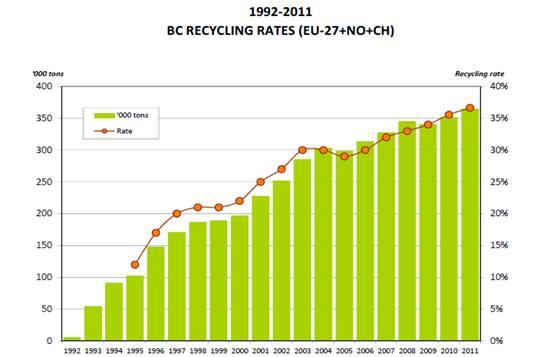The Alliance for Beverage Cartons and the Environment (ACE) reports industry figures showing beverage carton recycling in Europe continuing its steady growth, up to 37% in 2011.
The figure represents more than 350,000 tonnes of beverage carton materials recycled in the EU-27, Norway and Switzerland, while the total recovery rate (for recycling and waste to energy) was 68%.
“Our industry supports the objectives of the European Commission’s Roadmap to a Resource Efficient Europe,” says Katarina Molin, director general of ACE.
“The recycling and recovery of beverage cartons can help support the drive towards a circular economy, whereby waste is diverted from landfill and seen as a resource.”
Due to their high quality fibre content, recycled beverage cartons are seen as a valued secondary raw material by the paper recycling industry and are used to produce packaging for consumer goods, such as office stationery and cardboard boxes.
The beverage carton industry European recycling performance has steadily increased by more than 5% a year since 2000, outstripping market growth of more than 1% per year (tonnage).
“The beverage carton sector will continue to strive for increased recycling performance and ACE members are continuously working to support and promote recycling across Europe,” says Katarina Molin.
ACE provides a European platform for beverage carton manufacturers and their paperboard suppliers to benchmark and profile cartons as renewable, recyclable and low carbon packaging solutions, contributing expertise to EU policy, legislation and standard-setting.
ACE members include beverage carton producers Tetra Pak, SIG Combibloc and Elopak, and about 98% of the paperboard used by ACE members in beverage cartons in Europe is produced by Stora Enso in Skoghall (Sweden), Imatra (Finland), and Korsnäs in Gävle and Frövi (Sweden), also members of ACE.
ACE beverage carton recycling rates 1992-2011 - CLICK TO ENLARGE


